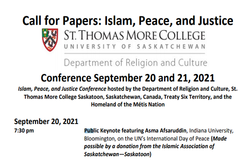Canada Conference to Discuss ‘Islam, Peace, and Justice’


The Department of Religion and Culture, St. Thomas More College Saskatoon, Saskatchewan, Canada, Treaty Six Territory, and the Homeland of the Métis Nation will host the event on September 20-21.
According to the organizers, “in order to help animate interest in Islamic Studies in Saskatchewan, the Department of Religion and Culture at St. Thomas More College welcomes abstract submissions for our upcoming conference examining issues at the intersections of Islamic traditions, peace, and social justice. This conference will bring together scholars working in both specific academic fields and across disciplinary boundaries.
We are interested in papers that challenge worn-out stereotypes about Muslims, their relationship with cultural and religious pluralism, and the connection between Islam and violent extremism. In the place of such stereotypes we are looking for reflective and critical articulations of how Islam and Muslims have, do, and can draw on faith-inspired principles and energies to fostering resilient cultures of peace and justice.”
Submissions are invited that address Islam and Muslims’ fostering (historical, actual, and potential) of cultures of peace and justice. Possible topics include, but are not limited to:
(1) the roots in the Quran and hadith of peacebuilding and fostering social justice;
(2) interfaith dialogue (e.g., Catholic-Muslim encounters) as a form of peacebuilding supportive of justice;
(3) Muslim figures, societies or social movements that hold lessons for peacebuilders and/or justice advocacy;
(4) intersections of sexuality, gender justice, and peace within Muslim praxis;
(5) Islamic education and formation for peace and justice;
(6) the supports within Islamic traditions for pluralistic societies marked by peace and social justice;
(7) Muslim critiques of structural violence and shallow peace;
(8) how Islam and Muslims' experiences provide resources for challenging and thinking beyond some of the limitations of dominant racially- and colonially-constituted conceptualizations of peace and justice;
(9) Islamic NGOs’ engagement with peace and justice issues;
(10) nonviolent resistance in the service of just causes within Islamic traditions;
(11) engaging Muslim justice traditions to work towards decolonization and reconciliation with Indigenous peoples;
(12) care for marginalized people as an Islamic moral imperative;
(13) policy and decision makers to engaging Muslim peacebuilders and justice advocates;
(14) intersections of care for ecology, peace, and justice within Muslim praxis; and
(15) Muslims in North America working for peaceful, just, and tolerant societies.
For more information click here.



